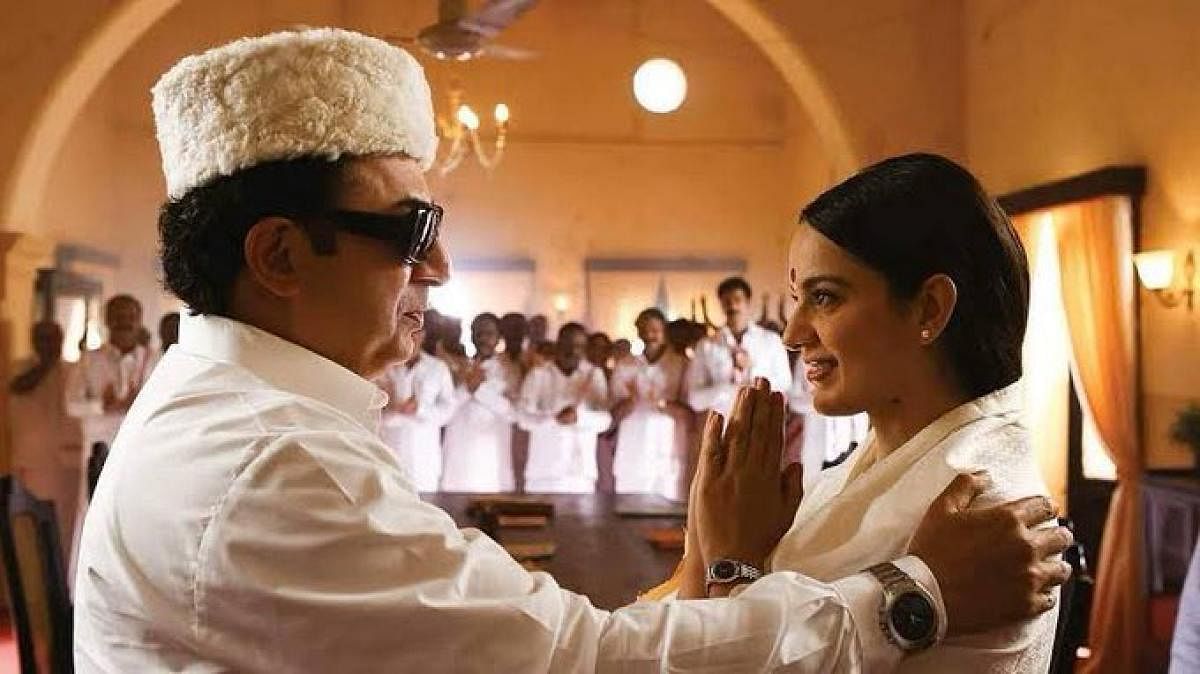
'Thalaivii' is a flattering if incomplete film on the life and times of J Jayalalithaa (1948-2016). A glamorous film star who became a feisty politician, she lived a colourful, tumultuous life.
In a famous interview with Simi Garewal in 1999, she said she had always been averse to the limelight. “I hated my career in films but I was the number one star of my time. Though I shouldn’t say it, I really don’t like politics but people say I am a successful politician,” she said with a laugh.
The film tells the extraordinary journey of a woman who broke gender stereotypes in cinema and politics, two fields traditionally dominated by men. What is remarkable is that she did not seek out those careers: she found herself in the thick of action by force of circumstances.
Director Vijay treats her story as a grand big-screen saga, but the biopic leaves many things unsaid. The Jayalalithaa-MGR romance is an enjoyable watch. The film astutely portrays the complexity of the relationship, given that he was already married, and their dalliance was common knowledge. Where the film fails is in capturing the drama of her rise to the top in Tamil Nadu politics after the death of MGR.
‘Thalaivii’ chugs along smoothly as Jayalalithaa (Kangana Ranaut) falls in love with MGR (Arvind Swamy), the actor-politician who enjoys a demi-god status in Tamil Nadu. She is playful and passionate in love. She is also shrewd when it comes to handling setbacks.
Throughout the first-half, the underrated talent of composer GV Prakash is on display as he recreates the sounds of another era.
Jayalalithaa’s transition from actor to politician is not portrayed with the attention it deserves. She is hailed for her administrative talent and political acumen, but all we get is a series of elevation scenes.
‘Thalaivii’ should have been a rousing experience. By playing to the gallery, Vijay squanders the opportunity of making a gritty political drama. He provides no insights into what made her 'puratchi thalaivi' (revolutionary leader) as she vanquished formidable rivals and rose to become chief minister.
For a biopic on ‘Jayalalithaa’, the film surprisingly feels like a tribute to MGR. After the introduction, she is pushed to the background till MGR’s death. What compensates for the lack of focus is Arvind Swamy’s acting. He has big shoes to fill as Mohanlal’s portrayal of MGR in Mani Ratnam’s ‘Iruvar’ (1997) has attained cult status. Arvind Swamy, aided by Karky’s sharp dialogues, commands our attention in all his scenes.
Kangana’s struggle with Tamil is evident, making us wonder if Nayanthara would have been a better choice. That said, if you ignore the poor lip sync in some places, the casting is good. Kangana brings high-voltage cinematic energy to the screen.
Samuthirakani, as RM Veerappan, MGR’s right hand man, is astonishingly good and this performance is another reason why he should consider less direction and more acting. Nassar unabashedly mimics Karunanidhi’s mannerisms, but is convincing nevertheless.
A comparison is inevitable and Mani Ratnam’s ‘Iruvar’ remains a better take on the three iconic figures of Tamil Nadu politics---MGR, Karunanidhi and Jayalalithaa. He extracted excellent performances from his cast, and audiences relate to them.
In ‘Thalaivii’, we are emotionally detached even when we are in awe of Jayalalithaa’s life. One wonders why Vijay omitted her troubled childhood, poignantly portrayed in the web series 'Queen' (on MX Player). What is also missing is the last part of her life, when she was convicted in a corruption case. ‘Thalaivii’ doesn’t entirely satisfy the curiosity it arouses.